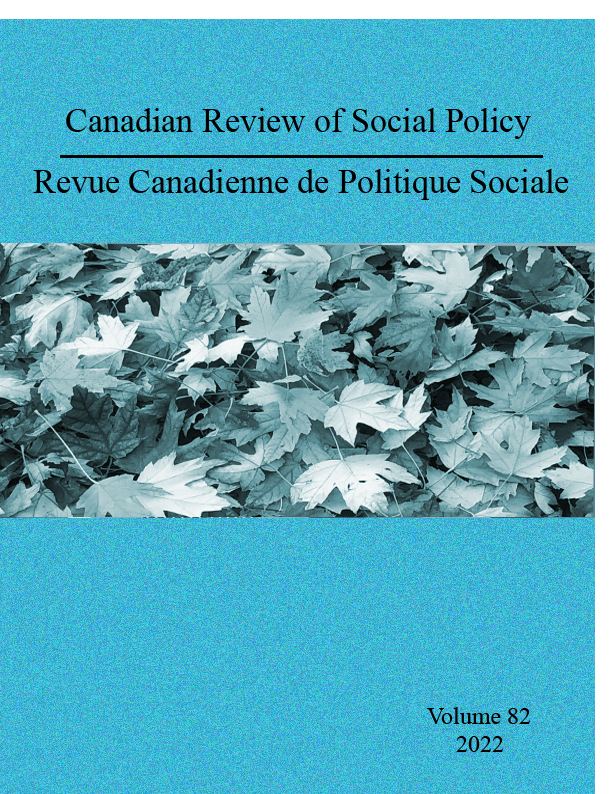Policy Instruments and Infant Feeding for Mothers on Social Assistance: A Comparative Study of Canadian Provinces
Mots-clés :
aide sociale, populations cibles, politique d’alimentation du nourrisson, provinces, instruments de politiqueRésumé
En utilisant un cadre modifié des social construction of target population — SCTP — (constructions sociales des groupes cibles) et la typologie des instruments de politique de Vedung, cet article présente une analyse comparative des instruments de politique ciblant les mères bénéficiant d’aide sociale pour imposer des normes d’allaitement « efficaces » dans les provinces canadiennes. Ce cadre permet une distinction entre les mécanismes d’interventions traditionnels des bureaux d’aide sociale et l’ajout d’une supervision supplémentaire par les professionnels de la santé. Les résultats révèlent de différentes combinaisons de mesures, malgré un but commun, pour encourager l’allaitement et dissuader l’utilisation de préparations pour nourrissons. La plupart des provinces utilisent des instruments de politique contraignants pour les mères qui choisissent des préparations pour nourrissons, comme l’exigence d’un certificat médical. Pour les mères qui allaitent, la plupart des provinces déploient généralement des instruments de politique bénéfiques tels que l’augmentation de leur allocation mensuelle avec peu de contrôle [du gouvernement]. Cependant, certaines provinces utilisent des outils très différents qui illustrent la diversité dans le contexte des soins de santé et de l’aide sociale. Le Québec, par exemple, est la seule province à fournir un soutien supplémentaire aux femmes qui choisissent d’utiliser la préparation pour nourrissons sans autorisation médicale. À l’Île-du-Prince-Édouard, les travailleurs sociaux peuvent exiger une note médicale pour l’allaitement maternel, tandis qu’au Manitoba, il n’y a pas de soutien supplémentaire pour les besoins nutritionnels des mères qui allaitent.
Téléchargements
Publié-e
Comment citer
Numéro
Rubrique
Licence
1-The author guarantees that the manuscript is an original work not published elsewhere in print or electronically in whole or in part, except in abstract form, that the author has the full power to make this contribution, and that the manuscript contains no matter libelous or otherwise unlawful or which invades the right of privacy or which infringes any proprietary right.
2-The author guarantees that the manuscript has not been previously published in print or electronically and that if the manuscript contains any tables, figures or images fully reproduced or closely adapted from previously published material, the author must obtain the necessary permission from the author/publisher holding the original copyright prior to publication in CRSP. The author may be required to produce evidence of permission granted to CRSP’s editors.
3-As a condition of publication in CRSP, the author assigns all copyright to CRSP, including but not limited to the right to publish, republish, and otherwise distribute this manuscript in print, electronic, or other formats. As CRSP is a non-profit interdisciplinary scholarly journal, the author will receive no royalty or other monetary compensation for the assignment set forth in this agreement.
For the purpose of full disclosure, CRSP will not normally use the content provided by the author in a commercial venture, but for the purpose of disseminating the author’s content to as many readers as possible. For distribution, third parties engaging in commercial activities may be contracted to distribute the content globally, and such parties may make a profit out of the author’s content in their normal course of business. CRSP will not pay the author or reimburse the author in any form based on such commercial activities because the conduct of such commercial activities is outside the control of CRSP.
Any future reference to or use of this published material by the authors must acknowledge CRSP as the original place of publication.
PERMISSION REQUEST/ARCHIVING
Permission is given to author(s) receiving funding via Tri-Council Agencies, the Canadian Institutes of Health Research (CIHR), the Natural Sciences and Engineering Research Council of Canada (NSERC) and the Social Sciences and Humanities Research Council (SSHRC), to make their publications freely available in an Open Access repository within the stated deadline by the Tri-Council Agencies (12 months following publication). Archiving of publication must be a manuscript copy bearing none of the CRSP headers, footers or any other distinguishing marks. No links to the article on the CRSP website is permitted.
Permission requests from third parties to reproduce articles in part or full in academic/educational publications can be directed to the managing editor of CRSP, and will not be unreasonably denied.

